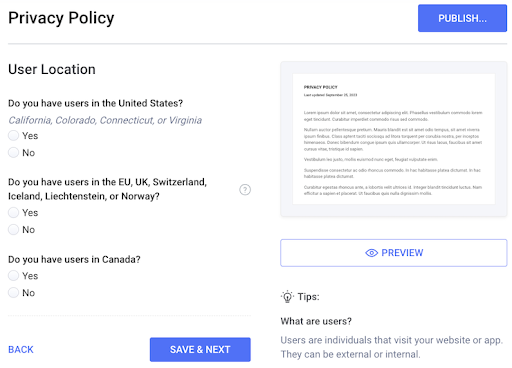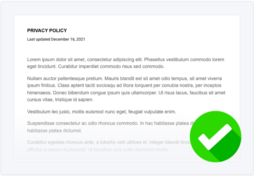If you own a gym with a website, it might collect personal information for users who want to sign up for a membership, join classes, or enroll in your email newsletter.
Data privacy laws may protect that information and apply to your business, requiring you to post a privacy policy on your website.
In this guide, learn why gym websites often need a privacy policy, how to easily make one, and what should go into it.
- Creating a Gym Site's Privacy Policy
- What Is a Privacy Policy?
- Which Privacy Laws Affect Gym Websites?
- Does Your Gym's Website Legally Need a Privacy Policy?
- What Are the Benefits of Having a Privacy Policy on Your Gym Website?
- What Should You Include in Your Gym Website’s Privacy Policy?
- Where To Display Your Gym Site’s Privacy Policy
- Summary
Creating a Gym Site’s Privacy Policy
You can make a privacy policy for your gym’s website by using an automatic generator, a template, or writing it yourself.
Use a Privacy Policy Generator
The simplest way to make a privacy policy for your gym’s website is to use Termly’s free Privacy Policy Generator.
Our comprehensive solution asks easy questions about your business and helps you comply with applicable laws.
It then generates a unique policy based on your answers that you can embed directly on your site, taking all the hassles and guesswork out of data privacy compliance.
See what it looks like in the screenshot below.

Use a Template
You can also use a privacy policy template to customize the privacy agreement to meet your gym website’s needs.
Just fill in the blank sections of the template with information about your gym and remove any clauses that aren’t needed.
You can then embed the policy directly onto your website.
Write It Yourself
You can also write your own privacy policy, but this is only recommended for privacy professionals and people with extensive knowledge about privacy laws.
Ensure you include all the essential information to fully comply with all applicable data privacy laws and avoid penalties and fines.
What Is a Privacy Policy?
A privacy policy is a legal agreement explaining how your gym’s website collects and uses personal information from users.
Data privacy laws may require you to have one, and it should include the following information:
- What personal data you collect
- How and why it’s collected
- If you share it with any third parties
- What rights users have over their data, and how to act on them
- Your company contact information
To ensure accuracy, your privacy policy must be updated whenever your data processing activities change and should be easy for users to find, read, and understand.
Which Privacy Laws Affect Gym Websites?
Several data privacy laws affect gym websites, including the following:
- General Data Protection Regulation (GDPR)
- California Consumer Privacy Act (CCPA)
- Colorado Privacy Act (CPA)
- Utah Consumer Privacy Act (UCPA)
- Virginia Consumer Data Protection Act (VCDPA)
All of these laws require covered entities to post a privacy policy.
They apply depending on details like where your gym is located, where your users come from, and the amount of data you collect.
Does Your Gym’s Website Legally Need a Privacy Policy?
Your gym website needs a privacy policy if it collects personal information from users and if you fall under any data privacy laws.
Gym websites commonly collect personal data from users when they sign up for a membership, join a class, provide their name and email address to receive a newsletter, or make some kind of purchase.
But it’s also a best practice to have a privacy policy as it helps keep your users adequately informed about what information you collect from them and how you use it, which fosters a more positive, trusting relationship.
What Are the Benefits of Having a Privacy Policy on Your Gym Website?
One of the primary benefits of a gym website privacy policy is that it helps ensure your business complies with data privacy laws and avoids the costly fines associated with violating them.
Some other benefits include:
What Should You Include in Your Gym Website’s Privacy Policy?
Let’s review the different clauses you should include in your gym website’s privacy policy.
Introduction
All privacy policies need an introduction section — here, include your gym’s name, define the terms in your privacy agreement, and outline who it applies to.
What Personal Information You Collect
List all the types of personal data your gym’s website collects from users and present it in an easy-to-read way, like in a table or bullet list.
Be very thorough — failing to list the data you collect accidentally or intentionally violates data protection laws like the GDPR and the CCPA.
Why and How You Collect the Data
Explain how and why you collect each piece of personal data. Under laws like the GDPR, this is considered your legal basis.
Your privacy policy should also include the methods you use to collect data on your gym’s website, including:
- Digital forms
- Payment screens
- Internet cookies
- Publicly available data
- Data collected from third parties
Children’s Data
You must have a clause in your gym website privacy policy explaining if you collect data from known children.
If so, you’re subject to following guidelines outlined by additional strict laws like the Children’s Online Privacy Protection Act (COPPA).
Otherwise, explain how parents and legal guardians can contact you just in case they ever believe you accidentally collected data about their child.
If You Share Data With Third Parties
Explain in your privacy policy if you sell or share any data you collect with third parties.
Include this clause in your policy even if you don’t share the data; just say as much in the clause, as users have the right to know these details.
Your Data Retention Policy
Under laws like the GDPR, you must explain to users how long you retain data and why you retain it for that time.
Or, if a timeline isn’t possible, you must explain the process you’ll use to determine when the purpose for collecting the data has been met, and the data is no longer needed.
Safety and Security Measures
Data privacy laws like the CCPA and others require you to include a clause in your privacy policy explaining the safety and security measures you have in place to protect personal data.
Your Use of Internet Cookies
Under data privacy laws like the GDPR, internet cookies qualify as personal information.
Therefore, you must include a clause in your privacy policy explaining if and how your gym website uses internet cookies.
What Rights Users Have Over Their Data
Your privacy policy must explain your users’ rights over their information and how they can act on those rights.
If multiple privacy laws apply to your gym, include a clause to represent each law so it’s easy for users to find the information that applies to them.
Updates to Your Policy
Include a clause in your gym website’s privacy policy that explains how you’ll communicate updates to your privacy policy to users.
Privacy policies are living documents that should be updated whenever data collection and processing activities change.
How You Handle Data Transfers
If you plan to transfer the data your gym website collects to other countries, you must explain in your privacy policy how you handle international data transfers to keep the information safe.
For example, under laws like the GDPR, you can only transfer the information to countries with the same level of protection as the Regulation.
Company Contact Information
Include a clause that features your company contact information so users know how to reach you if they have any questions or concerns about the privacy policy.
Where To Display Your Gym Site’s Privacy Policy
Plan to post your gym site’s privacy policy in multiple spots throughout your website, including:
- The footer of your website
- On any account creation or user login pages
- On any payment screens
- On any internet forms that collect personal data
A good rule of thumb is linking to your policy wherever data collection occurs.
Summary
Your gym’s website should have a comprehensive privacy policy that meets legal requirements.
Posting one also fosters a stronger customer relationship as it keeps your users transparently informed about what you do with their information.
Easily make a privacy policy for your gym website using Termly’s free Privacy Policy Generator.


